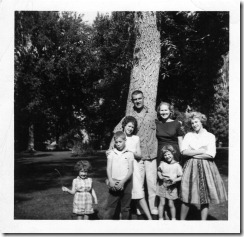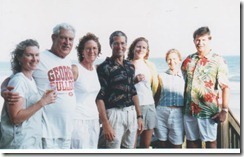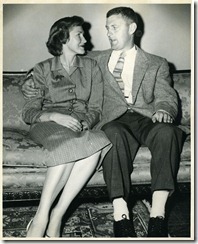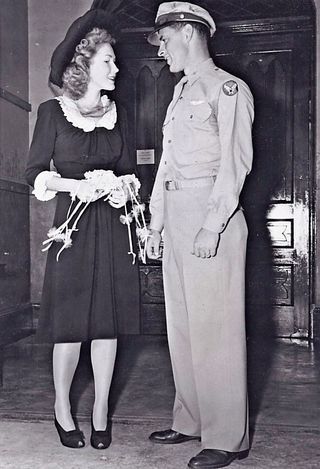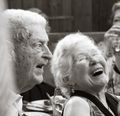Sheila Curran's Blog, page 2
August 12, 2012
Moving Along?
the author, to the left, waving a stick at transition. She is pictured above with only half her siblings. The oldest was taking the photo, the younger four were yet to be born. The family was still living in the place of her birth.
The topic for this blogging cycle is transition. This is a subject better left to those of stouter hearts and braver minds. I hate change. I hate moving. If, as the saying goes, you���re supposed to ���be the change you want to see,��� I���d most certainly be Lot���s wife, frozen in time, looking back nostalgically at my burning home.
Tomorrow I fly to New Hampshire to dismantle my parents��� household. My mom is still alive and well, but wise enough to realize that she ���can���t go home again.��� She moved to Atlanta shortly after Daddy���s death and has never returned to the place they made their home.
My siblings and I are meeting to organize the diaspora of their belongings. As a family, we moved often (which may explain my reason for loathing transitions). Still, the surroundings were always familiar, always comforting. The couches, paintings, French cookware and Mom���s pitcher collection. Persian carpets and antique side tables and my great-grandfather���s handmade desk, my father���s hutch, my mom���s vanity, grandmother���s empire sofa.
Mother will take a few pieces for her small house, but she wants her kids to take the rest or give it away.
It���s distressing for me to think of the objects leaving their familiar counterparts. Like in Toy Story, will they miss each other? Or maybe the centripetal force of love that held the family together presided over the objects. Once they���re sent flying off in different directions, is there any guarantee that whatever made my home so comforting can remain?
I know the Pollyanna response. Yes! Of course! It���s just stuff. It���s the memories you���ll cherish. And so forth and so on, as we skip down Hallmark Lane.
Maybe so, but I fear the undoing of the house. The intractable child in me doesn���t want to admit that those days, the ones in which I could go home to Mom and Dad, are done.
At this point in my blog, I got out of my chair to hunt for photos of that gorgeous house, to demonstrate to you its particular beauty. What I found instead, were only people. Flocks of them. So many you couldn���t see the furnishings, couldn���t see anything but smiling faces and arms wrapped round one another to usher yet another person into the camera���s frame.
The youngest four, in Athens, Ga, four moves after the first photo was taken.
I found something else too. Many of the best, happiest smiles were captured somewhere other than home. The beach, visits to cities, vacations, elsewhere.
our home away from home
Maybe, I thought, it���s not the furniture I���m really upset about after all.
Duh.
I think Dylan Thomas said, ���After the first death, there is no other.��� When my brother Tommy died, I took this as gospel. What, I thought, would ever hurt this badly again? I felt immunized now. I felt I knew grief.
Knowing something in its ferocious depth however, doesn���t innure you from suffering the bends the next time you fall into the well. Knowing your father was 92 when he died, that you had won the Grand Slam Lotto of family life, it doesn���t mean a whole hell of a lot.
You still miss the ���old fart���, as my dad called himself. You still mourn the fact that he won���t be on the other end of the phone when you call with news, he won���t be there to open the front door, or close it when you leave.
That being said, I think the thing I feared, the centripetal force that held our home together, it���s already left the building. Which is why my mom can���t bear to see such a vacant house, chock full of belongings. They, like the rest of us, keen for the gruff voice and welcoming presence that had made the whole place feel so alive.
So. Back to transitions. I realize now, much as I���d like to avoid them, it���s not an option. I can opt for paralysis but the world around me isn���t stopping just because I���d like it to cease its infernal spinning.
So maybe, instead of stalling, I can try to take the higher road. One that better resembles my parents��� unflagging courage. Maybe I can regard this as a chance to honor my parents by loving my siblings and treating them as delicately as the Waterford crystal we���ll be wrapping. Maybe I can take this opportunity as the gift it really is, a chance to pay my respects to a lovely mysterious thing. I can brush my hand along the family couches and burnished tables and to know that in this place, we experienced the extraordinary pull of two people who loved each other in such a way that anyone nearby could not help but be drawn into their comforting nest.
Sheila Curran is the author of two novels, Diana Lively is Falling Down, and Everyone She Loved.
Moving Along?
the author, to the left, waving a stick at transition. She is pictured above with only half her siblings. The oldest was taking the photo, the younger four were yet to be born. The family was still living in the place of her birth.
The topic for this blogging cycle is transition. This is a subject better left to those of stouter hearts and braver minds. I hate change. I hate moving. If, as the saying goes, you’re supposed to “be the change you want to see,” I’d most certainly be Lot’s wife, frozen in time, looking back nostalgically at my burning home.
Tomorrow I fly to New Hampshire to dismantle my parents’ household. My mom is still alive and well, but wise enough to realize that she “can’t go home again.” She moved to Atlanta shortly after Daddy’s death and has never returned to the place they made their home.
My siblings and I are meeting to organize the diaspora of their belongings. As a family, we moved often (which may explain my reason for loathing transitions). Still, the surroundings were always familiar, always comforting. The couches, paintings, French cookware and Mom’s pitcher collection. Persian carpets and antique side tables and my great-grandfather’s handmade desk, my father’s hutch, my mom’s vanity, grandmother’s empire sofa.
Mother will take a few pieces for her small house, but she wants her kids to take the rest or give it away.
It’s distressing for me to think of the objects leaving their familiar counterparts. Like in Toy Story, will they miss each other? Or maybe the centripetal force of love that held the family together presided over the objects. Once they’re sent flying off in different directions, is there any guarantee that whatever made my home so comforting can remain?
I know the Pollyanna response. Yes! Of course! It’s just stuff. It’s the memories you’ll cherish. And so forth and so on, as we skip down Hallmark Lane.
Maybe so, but I fear the undoing of the house. The intractable child in me doesn’t want to admit that those days, the ones in which I could go home to Mom and Dad, are done.
At this point in my blog, I got out of my chair to hunt for photos of that gorgeous house, to demonstrate to you its particular beauty. What I found instead, were only people. Flocks of them. So many you couldn’t see the furnishings, couldn’t see anything but smiling faces and arms wrapped round one another to usher yet another person into the camera’s frame.
The youngest four, in Athens, Ga, four moves after the first photo was taken.
I found something else too. Many of the best, happiest smiles were captured somewhere other than home. The beach, visits to cities, vacations, elsewhere.
our home away from home
Maybe, I thought, it’s not the furniture I’m really upset about after all.
Duh.
I think Dylan Thomas said, “After the first death, there is no other.” When my brother Tommy died, I took this as gospel. What, I thought, would ever hurt this badly again? I felt immunized now. I felt I knew grief.
Knowing something in its ferocious depth however, doesn’t innure you from suffering the bends the next time you fall into the well. Knowing your father was 92 when he died, that you had won the Grand Slam Lotto of family life, it doesn’t mean a whole hell of a lot.
You still miss the “old fart”, as my dad called himself. You still mourn the fact that he won’t be on the other end of the phone when you call with news, he won’t be there to open the front door, or close it when you leave.
That being said, I think the thing I feared, the centripetal force that held our home together, it’s already left the building. Which is why my mom can’t bear to see such a vacant house, chock full of belongings. They, like the rest of us, keen for the gruff voice and welcoming presence that had made the whole place feel so alive.
So. Back to transitions. I realize now, much as I’d like to avoid them, it’s not an option. I can opt for paralysis but the world around me isn’t stopping just because I’d like it to cease its infernal spinning.
So maybe, instead of stalling, I can try to take the higher road. One that better resembles my parents’ unflagging courage. Maybe I can regard this as a chance to honor my parents by loving my siblings and treating them as delicately as the Waterford crystal we’ll be wrapping. Maybe I can take this opportunity as the gift it really is, a chance to pay my respects to a lovely mysterious thing. I can brush my hand along the family couches and burnished tables and to know that in this place, we experienced the extraordinary pull of two people who loved each other in such a way that anyone nearby could not help but be drawn into their comforting nest.
Sheila Curran is the author of two novels, Diana Lively is Falling Down, and Everyone She Loved.
June 19, 2012
Father's Day
Today is Father’s Day. It also happens to be the day my father was born, on the stroke of midnight, in 1918. This allowed him a certain leeway in celebrating his birthday. This is a flexibility I find useful, since I am officially scheduled to post on the 18th, but must actually publish it on the 17th at 7 p.m.
On either date, I feel compelled to write about Daddy, skirting the suggested topic for this cycle (that unpublished book in my drawer) to dwell on the guy whose advice (“Why don’t you try writing a novel?”) gave birth to my writer self and whose love for my mother is both the stuff of fairy tales and true romance.
They were married on June 26th, 1943.
It was wartime, which is why my mother's suit is navy and Dad's wearing khaki instead of something finer.
Dad was 25; my mom was 21.
This year, for her 90th birthday, my mom didn't want a party, at least not for herself. Instead she asked that we all convene two weeks early, and celebrate the life of my father, who'd died one year earlier.
Instead of concentrating on the glory days, I talked of his final year, for that was when I think the true mettle of this decorated fighter pilot and much-loved professor showed itself. It was also, and not coincidentally, when I saw how deeply my father loved my mother. For an accomplished athlete who was still body-surfing at 90, accepting the sudden limitations of his physical strength must have been so difficult. Yet accept it he did, with grace and humor. I believe he pressed himself to live well past his expiration date, not simply because he wanted my mom to be okay, but because he couldn't bear to leave her.
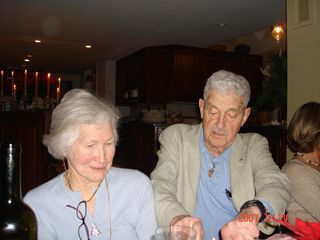
Dad cutting Mom's meat for her, Christmas Eve 2007
There is one moment in particular that keeps coming back to me. At the end, he needed help walking. I was accompanying him to the bathroom, a task that I’m sure neither of us could have conceived would ever be necessary just a few months earlier. To ease the awkwardness of the moment, or perhaps to acknowledge it, I quoted Tennessee Williams. “A high station in life is earned by the gallantry with which appalling experiences are survived with grace.” I then recounted some of my most humiliating moments during the aftermath of radiation. We were laughing at the sheer indignity of the human intestinal tract when my mom came in to the bathroom and crouched down to pick up some dirty laundry.
Dad’s attention seemed to fade and I thought perhaps he was feeling faint. He appeared to list towards the ground, and I reached out to steady him. Suddenly I saw what he was doing. His gaze was lazered on my mother. His hand was extended towards hers, offering her help standing up. Even in his weakest moments, he was still centered on making sure she was alright. It might be the most romantic thing I’ve ever witnessed.
What I loved about my father was not only his ability to be gallant in the midst of appalling experiences, but his will to see the best in those he loved. He ignored the crap and praised the one part of us that was trying to be something just a little bit better. Our aspirations mattered to him, as did our love for our spouses and children and friends, all of whom he and mom inquired about whenever we talked. They were such a beautiful match. We were so lucky, not simply to have them as parents, but to hope that in our most difficult times, we might aim towards the valiance and sheer power of will to believe that love conquers all.
It does, it will. You can take that to the bank. I even think it’s the one thing you can take with you. In fact, it could just be the transporting vehicle that will help each of us cross to safety. If so, I'm betting that superb pilot we all knew and loved might just have a hand stretched out our way.
February 17, 2012
Losing My Religion?
Last week an NPR talk show was asking Catholic listeners to call in and share their thoughts about birth control. I found myself wondering whether I'd meet the test. I was certainly steeped in the culture and tradition. My great-grandmother went to Mass to pray for a husband. She met a prosperous widower who'd lost his first job for being Catholic. My grandmother was their eighteenth child. Her inheritance went to the Jesuits. I spent my childhood in parochial schools. I'm the sixth of ten, or seventh of eleven, if you count my oldest sister's twin. (She lived three days.)
My mother, a convert, followed the Church's teaching on birth control, despite her severe morning sickness. Somehow she made it through those nine years of nausea without losing her sense of humor, or humility. She's the archtypal Madonna figure. Self-sacrificing, self-effacing, a calm Lady Madonna.
When I ask her about the rhythm method, she shrugs and says, "We were so stupid!"
According to polls, 98% of Catholic women seem to agree. I remember in high school, in a Family and Marriage class, the priest saying God had special reverence for women. I wonder now, though, how much you can revere someone while at the same time telling them they're incapable of deciding when and how they'd like to have children? In some ways, it's as if the little red hen says, "Who will help me plant this wheat?" and the priest says, "Not I. Agriculture is artificial interference with God's plan."
I presume that argument didn't get extended to grains because even the pope likes his bread and beer. Oddly, Viagra is also perfectly acceptable at most Catholic hospitals. I guess gravity is one law of nature you're encouraged to defy. Go figure.
It used to be that religion, politics and sex were not to be discusssed in public. Now, the three subjects, like drunk uncles at a family reunion, have wrapped themselves so tightly around one another that its hard to know where one ends and the other begins. Right wing politicians whip their congregations into a frenzy over sex. You have to wonder why this unseemly emphasis on our lady parts? What's missing? Or as the French like to say, "Cherchez La Femme."
She's notably absent from the pulpit, or the college of cardinals, conference of bishops or halls of the Vatican. Apparently, she's not smart enough to think for herself, which is, I'm afraid, the real reason I feel I'm losing my religion. Not because I don't believe in a beautiful, all loving God.
I do.
I just think she's been silenced in our Holy Mother Church, along with all those female parishoners who appear to be using their God-given conscience to separate the wheat from the chaff, or in this case, the ridiculous from the sublime.
For more about being/not being Catholic, read these essays by two of my favorite Catholic women writers.
February 8, 2012
PURE HEAVEN
Forbes magazine had an article on America's most generous people. Of course, since it's Forbes, they meant money, but there are so many other ways to be generous.
My grandmother had a belief that the more you gave away, the more that would come back to you.
One of the writers who's been most generous to me is Julianna Baggott. She's talked me up when I was down, off the ledge when I felt like jumping, and most of all, put me back into my story just when I was straying too far. As her students at Florida State's creative writing program and its motion picture classes can attest, this is a woman who gives.
She seems to illustrate my grandmother's belief. Despite taking time with so many people, despite having four children and a million friends, despite sitting down with a nobody like me, and lots of other nobodies, she has managed to produce more books than I have fingers and toes. Her latest, which comes out today, is bloody AMAZING. It's her best work yet, and this is a woman Richard Russo and others have said is one of the most talented writers out today. (Did I mention she's beautiful and exactly 13 years younger than I am? Not her fault. Despite this and her skinny body, I LOVE her. So does everyone I know.)
Here's the dope. No, not that kind. And no, I'm not looking in the mirror.
Julianna's newest book manages to cut through the clutter of the day and whisper to you that you've got something fun to look forward to. When I was reading PURE I found myself getting into bed earlier and earlier just to get back to the characters and escape into their world. It's that kind of book. I read it when it was in galley stages and I kept apologizing that I was recommending something that wasn't available yet. Well, now it is. And look what some pretty famous people are saying about it, justifying the megabattle over film rights that went on last year.
"... gorgeous ... You will be swept away."
-- Justin Cronin, New York Times Bestselling author of The Passage
"... extraordinary ... an important book ... by one of our finest writers."
-- Robert Olen Butler, winner of the Pulitzer Prize
"... nearly impossible to stop reading ... PURE packs one hell of an apocalypse."
-- Daniel H. Wilson, New York Times bestselling author of Robopocalypse
"... startling and addictive ... Breathtaking and frightening, I couldn't stop reading PURE."
-- Danielle Trussoni, New York Times bestselling author of Angelology
"... glorious ... full of wonderful weirdness, tenderness, and wild suspense. If Katniss could jump out of her own book and pick a great friend, I think she'd find an excellent candidate in Pressia."
-- Aimee Bender, New York Times bestselling author of The Particular Sadness of Lemon Cake
"A post-apocalyptic thrill ride ... "
-- Steven Schneider, producer of the Paranormal Activity franchise
"Original and masterfully written ... startling, harrowing and touching..."
-- Jeff Vandermeer, World Fantasy Award Winner, bestselling author of City of Saints and Madmen
Here's where you can order it, unless you've got a wonderful independent bookstore nearby, in which case, please march on over there and get it from them.
http://www.amazon.com/Pure-Julianna-Baggott/dp/1455503061
May the blessings we extend into the world, come back to us, proving Helen Ranger Curran's prediction. Until then, enjoy your reading!
January 10, 2012
Bad Habits: Great Reading
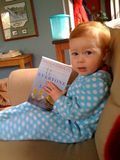 Graham Greene said all good writers have bad memories. I tell you this as an excuse for why I cannot remember whether it was Annie Proulx or Margaret Atwood who told Terri Gross, "In storytelling, there must be wolves." As in, danger. To illustrate, she offered the example of someone who comes back from vacation and cannot stop saying how fabulous it was. Counter that with a story of my friend. Her family got held up at gunpoint on their first day in Aix En Provence, and then, in an unrelated catastrophe, were robbed of everyone's computers, gameboys, phones, and Ipods on the second afternoon of their glorious summer in a small French village.
Graham Greene said all good writers have bad memories. I tell you this as an excuse for why I cannot remember whether it was Annie Proulx or Margaret Atwood who told Terri Gross, "In storytelling, there must be wolves." As in, danger. To illustrate, she offered the example of someone who comes back from vacation and cannot stop saying how fabulous it was. Counter that with a story of my friend. Her family got held up at gunpoint on their first day in Aix En Provence, and then, in an unrelated catastrophe, were robbed of everyone's computers, gameboys, phones, and Ipods on the second afternoon of their glorious summer in a small French village.
Is it Shadenfruede that makes us gravitate to what went wrong, rather than the Kodak moments of our friend's vacations? Or is it just more the element of surprise? Whatever, Ms. Proulx-Wood was right: there must be wolves.
Which leads me to my worst writing habit, my profound unwillingness to put my beloved imaginary playmates (aka characters) into situations where they might possibly suffer. Which leads me to pronounce that in the Decade of Dystopia, I have a sinking feeling I've written a Utopian novel.
It started with my sister's family moving to a neighborhood in Atlanta, a hidden gem of urban beauty, designed by Frederick Law Olmstead's sons to extend the meandering beauty of their father's Piedmont Park past its gated borders Built at the turn of the nineteenth century, the treelined streets and elegant brick houses make you feel like you've landed on a perfect planet. A walkable, bikable community close to chic restaurants, bars, museums, cafes.
So that's pleasant scenery (ie Kodak moment) number one. Oh my.
Fantasy number two is standard issue with me, a group of close friends who live in walking distance of each other. They're funny, smart, forgiving and just a bit eccentric. There is one bad apple, maybe two, in their midst, but for the most part, my Ansley Park neighbors are dolphins, not sharks. They are puppies not wolves.
To make all of this worse, one day, in this novel's infancy, an imaginary Catholic convent and church sprang into being.
Here, you would think I could find some problems. Nurse Ratchets of the nun variety. Maybe an abusive priest to go with the headlines. But no.
This is the grooviest convent in the world. More like an English country inn or yoga retreat, full of enlightened older women serving the poor. They, too, are funny, smart, irreverent and just exactly how I wish the real Church could operate in my oh-so-lapsed Catholic mind.
In my book of the same name, Our Lady of the Snows was spared during the civil war, when Sherman was burning Atlanta. A very small but effective rectangle of snow hovered above the church and motherhouse, keeping the buildings (and the slaves hidden inside) from incineration. It is a charmed place, full of charming sisters. They are are organic gardeners, great cooks, prolific vintners and die-hard football fans.
To say I've been searching for something like this since I let go of my regular attendance at Mass, well, it goes without saying. Call me crazy but if I'm making things up, why the hell can't I make a place that is exactly like where I'd want to go?
Into this perfect vacation of the mind, thank God or Ms. Proulxwood, other things have crept. Things like greed, envy, piety and hubris. They are my wolves, both real and fictional, driving my antagonists to topple the kingdom of Heaven, so to speak, with strategies fueled by fear, insecurity and a midlife crisis or two. (Maybe Lucifer thought it was just too dull to have everything go so perfectly all the time? Perhaps he wasn't so much evil as felled by profound boredom.)
Bringing out the wolves, as figurative as they might be, has taken a very long time. Like, oh, five years now. While the cancer thing might account for some of that, I think the rest has been my disinclination to put on my big-girl-pants and just let my people go!
If yoga is the path of love over fear (my new mantra) then this process has been a similar journey except inside out. Starting with the love and equanimity, what happens when fear -- whether of bankruptcy, betrayal or bullets – begins to chip away at the better angels of our nature?
When I think of my novel's conflict this way, I find some comfort. This is certainly a question that drives much of what I've been most entertained by this year. In HBO's Game of Thrones or SHOWTIME's Homeland, the main characters might be warriors, but they're undone less by weapons and more by avarice, deception and/or their own compulsions, the inner wolves that drive us all. In City of Thieves, a gorgeous novel by David Benioff set in Nazi-invaded Leningrad, the heroes' fates are still cast in the character flaws of their enemies, as well as in certain quirks and foibles of their own.
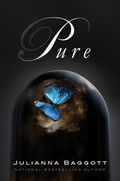 Similarly, in Pure, by Julianna Baggott, set for release on February 8th, the riveting plot may take place against an epic backdrop of monstrous beauty and perfect horror, (every bit as fantastic as Game of Thrones, every bit as apocalyptic as World War II). Still, the real action pivots on the internal struggles of our protagonists. Pressia and Partridge are dogged as much by the demons of memory and loss as the harrowing creatures that pursue them.
Similarly, in Pure, by Julianna Baggott, set for release on February 8th, the riveting plot may take place against an epic backdrop of monstrous beauty and perfect horror, (every bit as fantastic as Game of Thrones, every bit as apocalyptic as World War II). Still, the real action pivots on the internal struggles of our protagonists. Pressia and Partridge are dogged as much by the demons of memory and loss as the harrowing creatures that pursue them.
"A great gorgeous whirlwind of a novel, boundless in its imagination. You will be swept away."
—Justin Cronin, New York Times bestselling author of The Passage
"PURE is not just the most extraordinary coming-of-age novel I've ever read, it is also a beautiful and savage metaphorical assessment of how all of us live in this present age. This is an important book by one of our finest writers."
—Robert Olen Butler, Pulitzer Prize winner.
Getting back to that perfect vacation, the one your friend bored you to death telling you about, perhaps what's deadly dull isn't the beauty of those sunsets but the glossing over of the negative in pursuit of what I see as false cheer. I mean, really, who has had a perfect vacation? Ten to one, they're victims of their own internal PR campaign or they've found a drug I'd very much like to try.
Even the best of trips are replete with small problems, those lizards on the ceiling of your picturesque Mexican resort, the squatting toilet in that amazing Venetian restaurant, or just the itchy first day of getting accustomed to sudden leisure. Maybe what's compelling – whether in dystopia or utopia – is honesty, the acknowledgement that perfection exists only in magazines and Mommy Dearest's wardrobe. We may inhale those stylist's dreams of the day no one mussed up the couch by sitting on it, but the real payoff comes when we strive towards the immaculate, only to find the devil (and the drama) lies in the details (and those dratted wire hangers.)
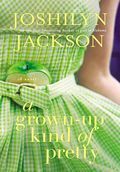 Speaking of drama, I am also looking forward to reading Joshilyn Jackson's newest, due out next week. A Grown Up Kind of Pretty, like Gods in Alabama, Backseat Saints and Between, Georgia, will, I can lay a bet on it, take 'pretty' out for a ride in a fast car on a back road till the word takes on a Flannery O'Connoresque meaning. Starred review, everyone. You go, Joshilyn!
Speaking of drama, I am also looking forward to reading Joshilyn Jackson's newest, due out next week. A Grown Up Kind of Pretty, like Gods in Alabama, Backseat Saints and Between, Georgia, will, I can lay a bet on it, take 'pretty' out for a ride in a fast car on a back road till the word takes on a Flannery O'Connoresque meaning. Starred review, everyone. You go, Joshilyn!
"A mesmerizing tale of a family coping with the revelation of a secret that will change their lives. . . Jackson's most absorbing book yet, a lush, rich read with three very different but equally compelling characters at its core." - Kristine Huntley, Booklist (Starred Review)
"Highly immersive... a compelling page turner." - Publishers Weekly
"Liza, as the unreliable narrator, is used to perfection in this warm family story that teeters between emotional highs and lows, laughter and tears. Book groups will eat this up."
- Library Journal
Reading A Grown-Up Kind of Pretty feels a lot like falling in love: giddy and enthralling and a little bit dangerous... Book clubs take note, here's your next pick!"
- Sara Gruen, NYT Bestselling author of Ape House and Water for Elephants
Lastly, I'm way overdue to read Jefferson Bass' latest novel, The Bone Yard, which is set in a gorgeous prep school-type location not too far from my native town. Talk about wolves. The guards abused the tenants of The Dozier School for Boys, both physically and sexually, and in a twist that links to Ms. Joshilyn's novel, a secret graveyard (true story) concealed the victims who died. After the book came out and Jon Jefferson, the writer behind Jefferson Bass' fabulously successful BONES series, championed the cause of a group of grown ups still dealing with Post Traumatic Stress Disorder, the state of Florida chose to close the campus and finally look at reforming the ways in which troubled teens are incarcerated.
 "A superb mystery novel-well-plotted, filled with memorable characters, based on accurate forensic science and written with more flair and literary sensibility than anything by John Grisham."
"A superb mystery novel-well-plotted, filled with memorable characters, based on accurate forensic science and written with more flair and literary sensibility than anything by John Grisham."
—Charlotte Observer on The Devil's Bones
"If you want to know what an autopsy theater really looks like, if you want to learn how to tell a skull's ethnic background by studying its teeth or how embalming works, Jefferson and Bass can tell you... Their books are well worth digging up."
—Wilmington Star-News on The Bone Thief
"This series, written by forensic anthropologist Bass (the creator of the real Body Farm in Tennessee) and Jefferson, just keeps getting better."
—Booklist on Bones of Betrayal
So: happy reading everbody! Who says January is the cruelest month? (Mr. Elliot is spinning in his grave. Mr. Greene, not so much.)
A nearly identical post will be published tomorrow @ the Girlfriend's Cyber Circuit Group Blog, otherwise known as a GROG, or http://www.girlfriendbookclub.blogspot.com
August 31, 2011
A Rather Unflattering Portrait of the Artist as a Young Woman
I took my first writing class at the age of 40. It was called Mothers Write, sponsored by the Public Library in Tempe, Arizona. Why did I wait so long, you might ask? For many of the same reasons it was decades before I hauled my butt into therapy. Convinced the shrink would tell me I was crazy (and snap his fingers for the men in white coats) I was also certain any writing instructor worth her salt would suspend my poetic license. This image was less drastic than the insane asylum, more like a slow folding of the tents I'd pitched around a desire that dare not be named, lest it be immediately quashed by those arbiters of literary talent with taste and judgment.
You see, even though I'd spent my childhood engrossed in books and even wrote plays we performed using the garage door as an impromptu curtain, it never occurred to me that I could be one of those godly creatures whose work I adored.
Add Catholic guilt to fear of failure and you've got the perfect recipe for a young woman who avoids college English altogether. She decides instead, after attending a lecture titled "Torture in Brazil" to major in saving the world. I put together my own course of studies, variously described, depending on my audience, as Latin American Studies, Agricultural Economics in the Third World and/or Ending World Hunger and Poverty and That's Not Funny.
By my senior year, I was insufferable. I knew everything. I knew nothing. I could not buy a record album (def: midcentury spinning disc played on turntable to produce sound waves) because that five dollars would feed a family in Bolivia for a week. In reply to an innocent greeting by an unsuspecting stranger, I might very well say, "Well, it's not a good morning in Chile." The more I discovered about Latin America, the harder I found it to describe, the more its miseries weighted me down. There was nothing I could offer in the way of practical solutions, given the failures of so many well-meaning souls who'd ventured there before me, only to discover that the Law of Unintended Consequences is otherwise known by the last name of Murphy.
Besides, there were dictators in Latin America, commanding militias bent on eating do-gooders like me for brunch and spitting us out before siesta. Worse, I'd heard there existed fun-sized cockroaches bigger than your head.
It was by chance that I read Gabriel Garcia Marquez, then Mario Vargas Llossa, Jorge Luis Borges, Isabel Allende. These titans of Latin American literature were able to express that imponderable complexity that had so defied my powers of exposition. The byzantine nature of life, described from within a culture rather than above or outside it. Most important and redemptive of all, these writers took neither themselves nor their people's struggles so much to heart that they forgot humor, valiance, happiness, love.
By George, they had it!
Exit, stage left, the missionary in faux-peasant dress. Enter stage right, a devotee of this glorious form of communication known as the novel. As in, that lovely relic from my childhood, that form of storytelling I'd been depriving myself of for years in the name of 'doing good.'
I applied to study comparative literature at the University of Chicago, eager to find the truths that fiction could teach. I soon discovered that –in the Eighties – notions like truth, beauty and even inspiration were wildly out-of-fashion among serious scholars of the book. What they pursued instead was a fugitive meaninglessness which one sought by plunging along with them down the intellectual rabbit hole and through narrow ant-farm diagrams of sentences parsed to the Nth degree.
I barely escaped with my Master's, prodded on by my patient boyfriend through the academic equivalent of Navy Seal tryouts. Susan Sontag, one of my program's more famous alums, had been quoted as saying she never felt smart enough to be at the University of Chicago. This sentiment buoyed me during that difficult time, plowing through Ulysses and Proust over the same weekend I was to digest and regurgitate Foucault, Levi-Strauss and Lacan. The result became a melting pot of confusion, or as Woody Allen famously quipped about having taken Evelyn Wood's speed-reading course, "I just read War and Peace. It's about Russia."
One of my favorite professors there taught Structuralism with a wink and a nod. She described the difference between our university and Berkeley. "Here, you go to a party and everyone talks about their work, sneaking away to see a movie or plant their garden. In California, they talk about their prize tomatoes or film, and sneak away to do their work.
I became a Californian, in spirit if not location. For years thereafter I waited tables, sneaking away to write novels, telling myself it was 'just practice' for the law I would someday practice. By the time my husband snagged a tenure track job at the University of Virginia, I was able to apply to both law school and the creative writing program. The MFA was my 'safety school'. Both rejected me.
Fast forward through two children, several nervous breakdowns, midlife crises I and II. Through it all, including somewhat abrupt relocations to England, Boston and Arizona, I continued to write fiction. Even more important, I read. Voraciously, omnivorously, from soup to nuts, Nora Ephron, Toni Morrison, Doris Lessing, John Le Carre, John Fowles, Ken Follett, William Styron, Pat Conroy, Kaye Gibbons, Susan Isaacs, David Lodge, Helen Fielding, Elizabeth George, Mary Doria Russell.
Meanwhile, I avoided rejection with the same assiduous caution that repelled me from close encounters with foreign insects. Better to keep myself and my dream alive than expose it to the venom that might fell me with one blow, or slowly sap my strength and jaundice me towards that one thing I loved like no other, the fictional dream.
Every few years I'd gather myself up and send out queries to agents and editors. It took five rejections, even if they were encouraging, to sentence my first two novels to death. Not good enough, I'd tell myself, and begin again. From page one, a new story, a fresh four hundred pages until the next dreaded submission.
When I tell this story to would-be authors, it's a cautionary tale. Rejection, I have come to understand very late in the game, is the rule, not the exception. Gird your loins, I tell them. How many years earlier might I have been published if I'd not taken an agent or editor's 'passing' as indicative of the value of my work?
On the other hand, it may very well be that the detours I took taught me more than I realized. My insufferable know-it-all without a sense of humor morphed into Siobhan from Everyone She Loved. The insectaphobe turned rejectaphobe took life in Diana Lively is Falling Down. Academia provided the landscape of comedy much as my prior earnestness had doused its flame. In the end, I had acres of time to develop my own sense of what was great, enjoying popular writers as much as I had Austen, Tolstoy, and Garcia Marquez, aiming my sights on a middlebrow form where high meets low at the crossroads, slapping their hands in time and refuting the silence of one hand clapping, over and over, afraid to make a sound 'til she gets it just right.
July 15, 2011
A Letter to My Family On the 20th Anniversary of My Brother's Death
Thankless Jobs, Unsung Heroes and The Honor Code
On Wednesday we went to Beth Palmer Freedman's funeral. Her husband Louis, speaking to a large crowd, said, almost bewildered, "She made everything so easy." Whether it was the clothes she laid out for him or the children she raised or all the little unseen things she did each day, he described it as if it was a Mary Poppins world he'd not really noticed, a kind of magic.
From the view of the outside world, the things Beth did were unrecognized as well. Louis' standing in his profession, the money he brought in to the house, the way he provided for her, that's what so many people think of as success. For an educated young woman, the know-it-all I was in my twenties, Beth's life of unseen service could be dismissed, or even demeaned.
This morning John woke me with a cup of coffee. He said the sweetest thing: "I wish I could always bring you coffee."
I thought about Dad. What we remembered, despite his amazing accomplishments, were the little things he did. The way he cared for Mom, the way he welcomed strangers into his home, his encouragement to any and all of us.
I remember when one of Tom's friends was getting married, he asked Dad for advice. Dad said, "Just don't get caught up in counting who's doing what. Then you'll be fine."
For me, at the time, that counsel was hopelessly old-school. It was contrary to what I was aiming for in my own relationship. Whether it was doing the dishes or waking with our kids, I wanted John to do 'half.' My reasoning was that if I didn't insist on equality, I'd get 'stuck' doing it all. He'd not even notice, and in the end, he'd have his career and I'd have no time to aim for any of my own dreams. I felt certain that my striving for gender equity would result in a better end, one in which we both got to do our share of the sh*t work. In the end, neither of us would resent anything, and we'd both get to aim for some glory as well. (I'm not dismissing the importance of a world in which women have struggled for 'equality'; I'm only questioning the concept that certain kinds of work are elevated while others are diminished.)
None of us are really church-goers, but in some ways, Dad's advice, and his and Mommy's example, the thing that Louis was marveling about Beth, was a little bit like "turn the other cheek." A little bit like "Do unto others as you'd have them do unto you." Forget the money, forget the glory, just do what you can for those you love and the rest will follow. It's so counter-intuitive, so opposite the 'survival of the fittest' that I begin to understand its radical underpinnings.
Mom 'offered herself up' so beautifully, and so invisibly, that she made it look easy. When things got tough these last two years, so many people stepped up to help her take care of Dad. Tere and Ellen and Karen and Ranger and Bob were spelled by out-of-towners who came when they could, aided by the lovely small town network of medical care and friends like Sally Mckelvey or Mark Funk or Bill Toms who'd stop in when they could. Scott flew them to the beach the last year Dad was able to go. Larry was the most highly paid (yet unpaid) flight attendant the world has ever seen.
When I see Mom and we talk about how she's doing, the first thing she tells me is how lucky she is. She recounts each person's care for her as if it's magic. And it is. Whether it's Mac and Gil waiting on her "hand and foot," or Tere and Ellen showing up in the middle of the night during a crisis, she's got that same note of incredulity in her voice I heard from Louis as he talked about Beth.
I said to her, "Mom, you're the one who did this first, who set the example. Everyone loves you. They want to do it. It's a pleasure."
And it's true. When I mourn Dad's loss, I'm most grateful for the times I was able to help, to do something he appreciated, whether it was making him laugh or carrying his oxygen tank. As a kid, I always thought we were supposed to aim our sights on those things that get you into the New York Times obituary page, the recognition of the marketplace for true achievement. But when it comes down to it, I think what we'll remember is that we did for others as we'd have them do for us.
We all have our turn to serve. There are times, particularly when your children are young, that it seems as if it will never end, this so-called opportunity. It does and it will, and when you look back on it, you may be like our own mother, who so forgets her endless days that she will shake her head at someone else's unswerving motherhood and say, as if it's an impossible challenge, "How in the world can she do it?"
We've all seen those marriages in which the roles are so lopsided we want to rescue the wife, or husband. Their spouse seems not to notice, or worse, to accept the constant caretaking as his or her due. I've always thought the ones doing all the taking were exploitive, grasping what they could and giving nothing back.
I had a 'friend' in Arizona who came to our book club pot lucks and never brought anything. She didn't think anyone would notice. She even told me those women were 'chumps,' that she was getting something for nothing. If they were too stupid to notice, she might as well come in and take what she could. She thought this was fine, since she was smarter than they were.
As a hopeless counter who's done her share of grumbling about who didn't do their part, I am only now beginning to see something my parents recognized a long time ago. It can't be taught, and perhaps it will never ever make itself known to the person who thinks she's pulled one over on everyone else. There is a pleasure that comes from giving and a resulting gain in self-worth that can't be gamed. Let the 'user' keep on using, she'll never know what she's missed. All she may find is, that much as she acquires, something is still gone terribly missing.
This brings me back to Dad, to a story he told about his time in England with other American pilots. They were at a cocktail party and one of the Yanks was saying he'd forgotten his money and been allowed onto the subway system, which (at the time) had an honor code. All he'd been required to do was write down his name and address. One of the Americans in the crowd said, as if the Brits were stupid, "Geez, who'd write down his real name and address?"
One of the English pilots simply replied "Who wouldn't?"
On this anniversary of Tommy's death, I'd like to say thank you to all of you who've stepped in and done my share, who've taken on a chore I didn't do. To Mac and Gil, who provided Mommy with a soft berth after losing the love of her life, we all are so appreciative. To Cath and Larry who have offered her a small place to get back her sea legs, this is only one of the many gifts we all have gotten from you two, and again, if you don't think we're noticing, we are. Tere and Ellen, for the nights before we came, when you stayed up all night to keep Dad from getting out of bed or helped him walk, each of you holding him up, we noticed.
If I thanked all of you who have helped to shepherd the rest of us through an awful time, I'd take several pages. The great thing is, you all know who you are, and what you've done. No one can take that away from you.
Mom, you especially, might underestimate your service, not just in the past few years as Dad needed more help, but all those years, when he sang your tributes. He might have done it out of tune, but no one ever doubted the truth of what he was saying. You were his sunshine, and now you're ours. The example you set keeps on generating its own little engine of giving, whether it's bringing home a paycheck or detailing a car or taking someone golfing or making a fabulous meal. The ashes will go back to ashes, and the dust to dust, but in the end, that torch of giving will keep getting passed along, to new generations and to an ever-expanding network of bearers, each warmed in the smallest of ways by the privilege of being able to contribute.
I love you all.
Sheila
p.s. for any and all of you who've benefitted from HOSPICE, I was just told that in our little town, they'd lost a lot of funding due to federal budget cuts. Their best doctor had resigned so others could be kept on. If you feel disposed, please donate to your local Hospice, for these people are truly unsung heroes.
July 7, 2011
Independence Day, Maybe Too Little But Never Too Late
Okay, so the 4th has come and gone and I'm still thinking about the subject of independence, which can mean so many things. There's the patriotic kind, which I tend to celebrate more by thanking my lucky stars I get to live in this beautiful land under the rule of law, a freedom I don't take lightly. I know how many people have risked their lives, and livelihoods to get us where we are today. I thank them. I would even gladly pay more taxes to show my gratitude. How retro!
The sort of independence I'm chasing lately is highly personal. It might even be deemed suspect by those arbiters of good psychological health, the imperious they who seem to operate like a Greek chorus of guardian angels in my brain. You should step outside your comfort zone, should accompany your husband on an almost free business trip to Europe, should get over your almost agoraphobic need to remain at home in order to stick with your novel.
For years I've abided by the conventional wisdom of so many experts. In order to become a better person, I needed, I was told, to stretch myself. Take on unfamiliar assignments with gusto, even if the five minute TV interview that went smashingly cost me three weeks of anxiety, or the upcoming book talk at my college reunion sabotaged my ability to enjoy the beach vacation immediately preceding it.
I felt that if I just kept plugging away, I could finally overcome this silliness of mine, this desire for routine and order and sameness, this risk-aversion bordering on pathological.
Decades ago, when my brother Tom was going through a bone marrow transplant, I remember calling him to recount what I thought was a funny story. I tend to make myself the butt of jokes. My anxiety is – in my family – like a quirky pet we all like to poke fun at. I'd returned from a lake visit in Wisconsin, wherein I was in a motor boat with my four-year-old son and his friends. The teenage girl who was driving suddenly offered me a chance at the wheel.
"Go, Mommy!" my son yelled.
For just one minute, I had delusions of grandeur. I grinned. I think might have I even nodded, my game face on.
The driver stood and started the hand-off requiring that I step in and take the wheel when I realized that I might very well kill us. Instead of moving over and calmly putting my hands at two and ten o'clock, I sank to my knees, grabbed the bewildered young woman's thighs and begged her "Please don't make me do it!"
We laughed, my brother and I and then I nattered on about a speech I had to give to the foundation of the college I worked for. I was terrified. When I'd exhausted my supply of fearful commentary about the fool I could very well make of myself, Tommy paused and said, "Sheila, just drive the boat."
My foundation talk went wonderfully. A year later, almost to the day of that phone conversation, I told the 'Drive the boat' story at Tommy's funeral. Those words became code in my family for those things we feared but nevertheless knew we had to do.
Twenty years later, I'm still trying to drive the boat. The trouble is, each time I succeed in public speaking, it makes not a whit of difference in the paralyzing anxiety I experience beforehand. The only exception is when I have to do it routinely, say on book tour, and then it's a piece of cake.
When I accepted the invitation to speak at my college reunion, it was far enough away that it didn't seem problematic. Even in March, when I visited my father and mother and mentioned it to them, it was only a cause for congratulations and a true feeling of gratitude. (My college held a very dear place, not just in my own heart but in that of my parents too.)
The next time I visited home, my father was still alive, but not conscious. He died the next morning, surrounded by his kids. Eight weeks later we all gathered at the beach, as we have done for nearly thirty years. We cast some of his ashes into the same water we'd bodysurfed with him just two years earlier, when he was ninety.
I left that vacation with my siblings a day early to fly to Cincinnati and drive to Oxford, Ohio, a tripartite errand during which I first had to keep the plane from crashing, then drive a car on unfamiliar turf after losing my glasses and third, deliver a speech which I'd not been able, despite many days of working on it, to get 'right.'
The next morning happened to be my father's birthday. I told myself I was meant to be there. I ended up "winging" the talk, something I never do, and sharing a really lovely hour with intelligent women and men I admired. I met lots of new people, sold some books and enjoyed being back in my old dorm room, walking the halls and reminiscing.
So the moral of the story should be that I came home with renewed enthusiasm to drive the boat. Not so much. Instead, while on a walk with a dear friend who is also a therapist, I said I'd been searching for the meaning in this experience, and yet no grand epiphany had as yet emerged. At that moment, though, even as I said that, the light bulb went on. I found myself saying, and really meaning it, "Maybe the point is that I really don't have to do this anymore."
Wow. Seriously? Could I possibly be right? I know it counters the wisdom of the Protestant Ethic and Catholic Guilt as well as my own code of constant self-improvement.
Here's the thing. I have understood that life will present me with many opportunities to 'stretch myself." And though it's a mighty thing to chug and chug and keep on chugging, it's also okay to let yourself off the hook.
I remember playing tennis with my dad. He'd tell me that only for the first five minutes of the game did I need to concentrate on lessons the pro had taught. After that I should just forget it and play.
So here's to stretching myself in a new direction, that of not caring whether I measure up to an ever-increasing goal. Here's to playing the game as I want, letting myself off the hook, and being myself, even if it means owning my silliness. I'm going to stay put and do what feels comfortable for a while. To paraphrase the author of LETTERS TO JACK who I heard on my beloved NPR, when asked about an accident that paralyzed him, he said that he'd never understood the meaning of happiness until he was stuck with who he was and not constantly striving. So in that spirit, I too am taking leave of my senses, or maybe finally taking note of them.
April 22, 2011
Crossing to Safety: He Will Be Remembered
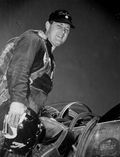 Ranger Curran, Sr., 92, made his final landing on April 19, 2011. He was a World War II fighter pilot, logging 340 combat hours and won the Distinguished Flying Cross among other medals. In 2002, he was inducted into the Air National Guard Hall of Fame for his participation on the nation's first jet precision acrobatic team, "The Minute Men."
Ranger Curran, Sr., 92, made his final landing on April 19, 2011. He was a World War II fighter pilot, logging 340 combat hours and won the Distinguished Flying Cross among other medals. In 2002, he was inducted into the Air National Guard Hall of Fame for his participation on the nation's first jet precision acrobatic team, "The Minute Men."
Colonel Curran retired from the Air Force at age 45 before earning a Ph.D. in Management from the University of Georgia. He then taught at Youngstown State University, before moving to Keene State College in 1981, where he remained as a faculty member until his 82nd year. For several years the family lived in Dublin, where he had summered as a child, before moving to Keene in 2001.
Serving on international commissions, Ranger Curran's proudest accomplishment was his marriage to Celia Galbreath, who was a true partner in all he did.
Having lost their son, Tom, to cancer in 1992, Ranger and Celia cherished each of their remaining children as well as an ever expanding circle of loved ones who joined the family over time.
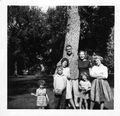
An avid athelete, Ranger was a Golden Gloves boxer, played football for Worcester Polytech, coached the US Air Force boxing team, and played squash and tennis well into his eighties. Having been educated at WPI and the University of Minnesota, then interrupted by war, Ranger finished his baccalaureate at Boston University, he kept up a keen intellectual life until his final days.
Ranger is survived by his bride, Celia, and children, Carolyn (and Frank Stafford) Mary Ann (and Gil Hudnall), Deirdre, Ranger Jr. (and Karen Curran), Tere (and Bob Clarkson) Sheila (and John Corrigan), John (and Holly Curran), Ellen (ODaniell), Mike (and Beth Curran), Cathy (and Larry Dorfman), twenty-five grandchildren, eight great-grandchildren and countless 'shirt-tail' relatives. His sister, Betty Huntress and dear cousin, Virginia Mersch mourn him as well.
A celebration of his life will be held at the Keene Country Club, on Saturday, April 23rd at four o'clock. Those wishing to commemorate Ranger are invited to donate to Hospice at HCS, 312 Marlboro St., Keene, NH 03431. Arrangements are handled by Fletcher Funeral Home, but calling hours will not be held.

